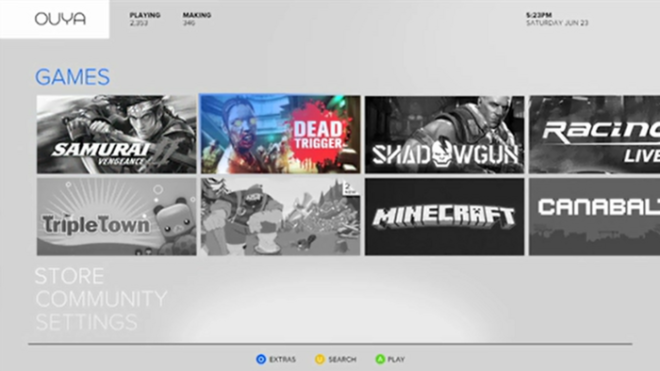
Who would have thought a game console powered by Android would have raised so much damn money? Meet the OUYA, the Android-based console that raised nearly $8.6 million on Kickstarter, an amount that is rather mind-boggling, to say the least.
If, for some reason, you're not sure what the OUYA is (it's not like the Internet isn't buzzing with news about it), here's the quick recap: It's a small, snazzy $99 Android console that promises to be an open-source, hackable alternative to the current stable of big-budget names. Julie Uhrman, the CEO and founder of OUYA, was kind enough to take a few moments of her schedule to answer more than a few questions about the development process, OUYA's hackability, and more.
GeekTech: Why is the OUYA all in caps but not an acronym?
Julie Uhrman: The O in OUYA stands for Open. The rest? We just liked how it sounded. Maybe down the road we can flesh out the rest of the acronym, or perhaps one of our fans will. Would you like to take a stab?
Er. No. Next up, what's the price of the device going to be like? We know it's $99 now but what will it be in the future?
$99.
Now, here's a question that may be of interest to the developers in the audience. Are there any plans to curate the store, or will it be a free-for-all?

OUYA's Julie Uhrman.
Yes, we will be curating ourselves and using algorithms to surface interesting and relevant games. This is something we are currently working on. We had a great suggestion on Reddit to use game play data (as opposed to sales data) to surface the games that people are enjoying most. The whole issue of discovery is one of our most important tasks. We're looking at genre categories, getting expert picks, and observing data to make sure that people can easily discover games that they will love, matched to their unique tastes.
I see. How do you plan on keeping this from turning into gatekeeping?
Every game that gets published will be available, and we'll try to make it possible to discover games in more than one way. We're not interested in being gatekeepers. OUYA is all about being open. We're interested in creating a wonderful experience.
That's absolutely great. However, I've heard more than a few worries about the security of the software in the store. How do you plan to prevent possible malware? What kind of security procedures will you be using?

The OUYA was designed with hardware hackers in mind. We'll do standard app reviews to screen for possible malware. Of course, since you can always restore a system profile (our concept of "planting" a device after it has been rooted), and we'll store all the payments information in a secure way, we believe the system's security will be appropriate—while allowing users the freedom to use the device as they see fit.
What about hacking and software piracy? With such free access to the OUYA's innards, what's to keep people from making off with the shop?
Hacking the hardware doesn't give anyone access to the games themselves. All paid content will require the gamer to authenticate with our servers.
Here's a question from an indie developer: Will there be an OUYA devkit emulator? For example, are there any plans for a PC/Linux-based piece of software that behaves like the OUYA?
We still have to figure that out. There are current Android emulators that can enable you to get started developing, but we'd have to look at creating software that emulates the specific hardware performance of OUYA.
On that note, why Android over Linux?
Android includes so many different frameworks and drivers that a game console would need, and has tremendous developer momentum. It's built on Linux, of course, so it also captures many of the performance advantages of the Linux kernel.
Moving on, will users be able to upgrade the OUYA on their own with parts they buy out of a computer store?
They can access the USB port to add peripherals, and the circuit board itself. They'll have to know what they're doing, but we are explicitly encouraging people to mess with the device. Ultimately, we hope that the best ideas catch on and go big—we'd love to have a great new OUYA peripheral come from the hardware hacking community.

Will there be cloud storage?
We're looking into this. There are so many cloud storage options available for developers, we'll see what the benefits are to a native solution. But for the time being, I don't want to make any definitive statements.
What about voice chat?
Although this voice chat is a feature that we will consider for the future, we won't offer voice chat natively at launch, so game developers may need to add their own. We will look at it over time.
The next question is from a fighting game fan—how thoroughly will you test your D-Pad? It doesn't seem really ideal for that genre right now.
Kickstarter is an amazing forum because it allows us to communicate directly with our future customers. The D-pad has been the subject of lots of great feedback. And because of what people are saying, we're re-examining the "rocker" based D-pad right now, and looking at a more standard solution which may work better.
Fuente:
http://www.techhive.com/article/2000317/a-few-minutes-with-ouya-founder-julie-uhrman.html


